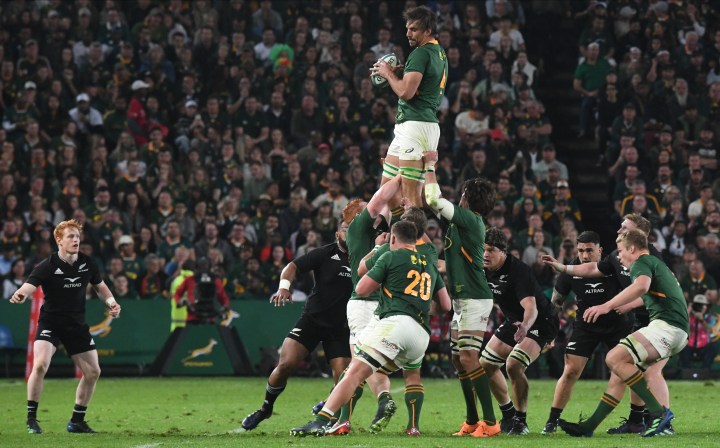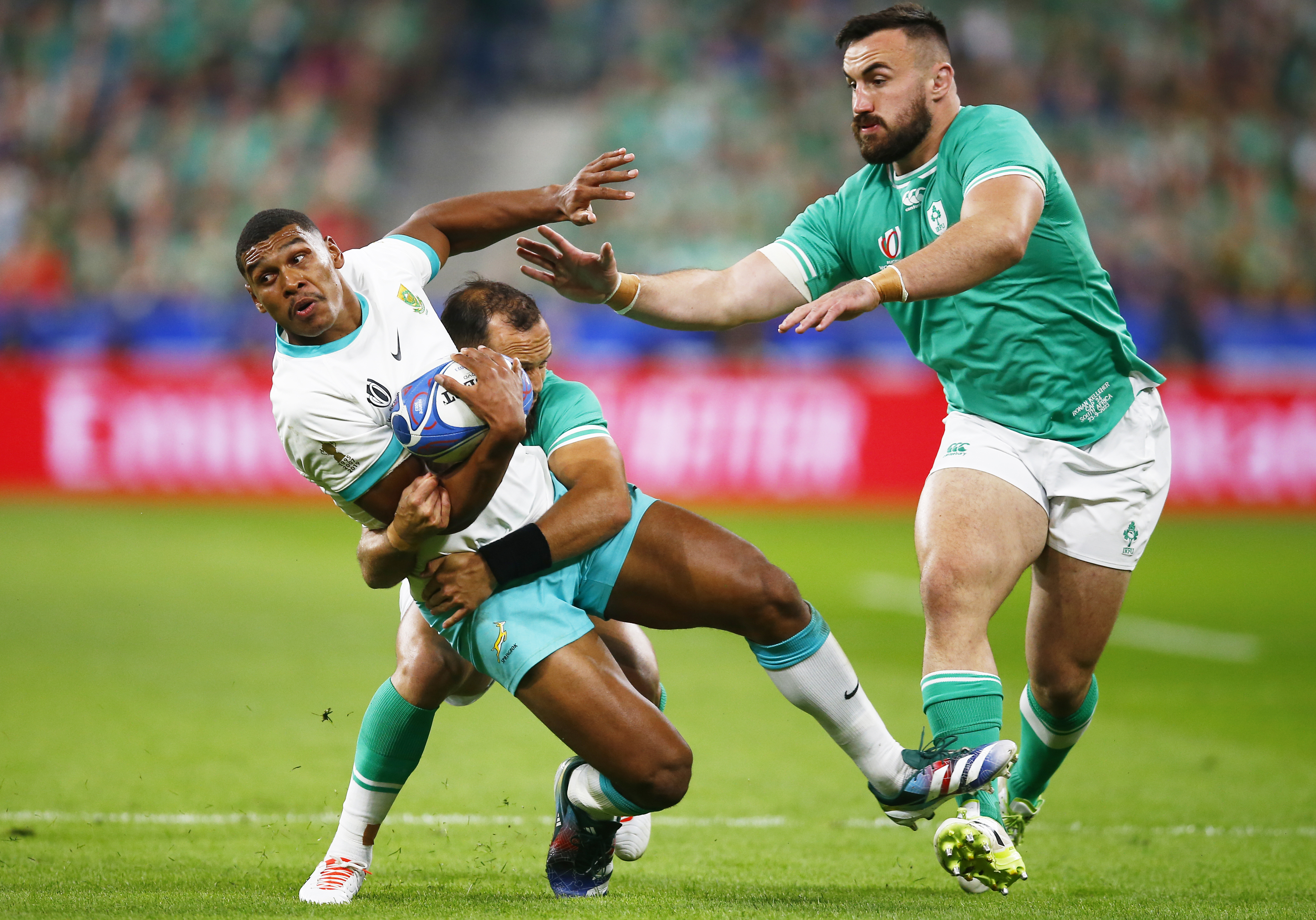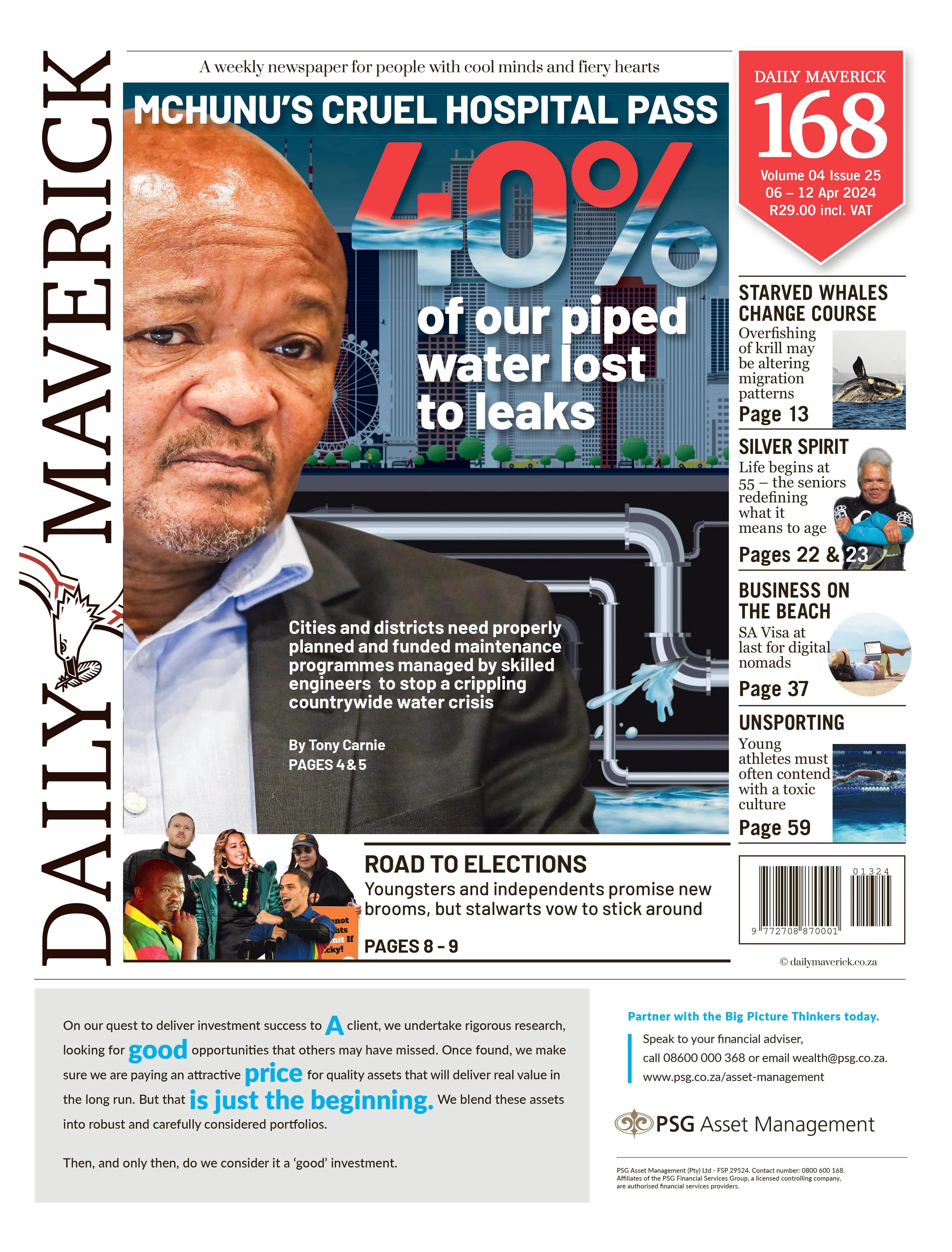PLAYING DUES
Rugby unions unhappy about the Bok Test fee, but miss the point that it’s for the benefit of all

The fees are there so that the money earned from the Boks can support smaller rugby unions.
Last month it emerged that South Africa’s leading rugby unions – the Bulls, Lions, Sharks and Stormers – were unhappy with the “fee” they are required to pay to host Test matches.
It is a curious standoff, considering this model is not new and was also agreed by the self-same unions at a meeting of the South African Rugby Union’s (Saru’s) general council late last year.
It does, however, raise a problematic issue for a country such as South Africa – the cost of ticket prices and access to Springbok Tests for average fans.
But let’s first recap.
Collectively, Saru put a fee of R85-million on the six home Tests that the Springboks will play in 2024. The unions hosting Tests this year will have to pay varying amounts to the mother body to cover their fee.
Six Nations champions Ireland play twice on their tour. They meet the Boks at Loftus Versfeld in Pretoria and Kings Park in Durban.
Later in the year the All Blacks face the Boks at Ellis Park in Johannesburg and at Cape Town Stadium. The All Black Tests will be at a premium of R20-million each for the Lions and Western Province, and Ireland’s cost is R15-million per Test.
Interlocking ecosystem
Although this seems a hefty price to pay to Saru, it’s also part of the interlocking state of the professional game in South Africa.
Unions have always paid a fee for hosting Tests, albeit not as high as R20-million. In 2019 it was agreed that Saru would move away from the fee-paying system to a new model, in which it awarded Tests but kept the bulk of the revenue, as is the case in most of the world.
Before it could be implemented, though, Covid hit and professional rugby went into survival mode, with just about the entire 2020 season cancelled and all of the 2021 season played behind closed doors. Fans only started coming back in 2022 when government restrictions were lifted.
Throughout those tough years, Saru still paid its broadcast income disbursements to all unions in the country, as well as many other related costs, even though it was severely hampered by huge losses in earnings, with the Boks not playing, or playing to empty stadiums.
That is why the general council agreed that Saru could return to the previous “Test match fee” model, to try to recoup costs with another projected loss expected in this financial year.
Boks belong to South Africa
Many insiders in the rugby ecosystem who Daily Maverick canvassed believe that the fee-paying model is justified, but that the asking price this year was probably a bit high.
Even so, the Ireland Test tickets sold out within hours and the Bulls and Sharks, selling roughly 50,000 tickets at an average of about R1,000 per ticket, can expect to make a huge profit on the Test.

Damian Willemse is tackled during the Springboks’ World Cup Pool B match against Ireland at Stade de France in Paris on 23 September 2023. (Photo: Steve Haag / Gallo Images)
Tickets for the All Blacks’ Tests have not gone on sale yet but the most expensive seats for the Ellis Park showdown are set to cost close to R2,500 per ticket, and there are only a handful of the 60,000 tickets priced at R350. Cape Town prices might even be higher.
Though the unions are crying foul about the fees they have to pay, they are still going to walk away with roughly R30-million turnover for hosting the match. Once all their costs are deducted it will still be a sizeable windfall.
It’s also important to remember that, although it’s the big unions that get to host Springbok Tests, the Springboks belong to all of South Africa. That is why there is a fee, so that money earned from the Springboks is used to support smaller rugby unions.
The unions also failed to acknowledge in their letter to Saru, which was “leaked” to some media outlets, some of the benefits they gain from the mother body.
For instance, Saru is footing the R300-million-a-year cost for South Africa’s five premier teams – the Bulls, Cheetahs, Lions, Sharks and Stormers – to play in Europe.
By paying for entry to the United Rugby Championship and European Professional Club Rugby, Saru is providing competitions and a platform to help unions to commercialise their brands.
Saru also pays R120-million a year in player insurance for professional players throughout South Africa and more than R100-million annually in image rights fees.
Each of the major unions is also paid R47-million in disbursement fees, and many Springbok players’ salaries are also topped up by Saru, which makes it feasible for them to stay and play in South Africa.
It’s unsurprising, then, that Saru president Mark Alexander was less than impressed with the unions’ griping about Test match fees.
“We strategically allocated Tests to our unions, and that was done to boost their season tickets and to assist them in generating additional revenue,” Alexander said.
“We are unique because we’re the only international rugby union that allocates Tests to a member. Internationally, if you look at what the Test revenues bring, the Rugby Football Union in England last year generated £48.8-million without hospitality, and the Irish Rugby Union generated €43-million with hospitality.
“I think we’re being more than generous to assist our franchises in generating additional funds.
Read more in Daily Maverick: Springboks’ busy 2024 schedule completed with confirmation of Wales clash at Twickenham
“We thought we were assisting them with goodwill to allocate Tests to member unions where, around the world, that is part of the main union’s main revenue stream.
“The Test guarantee is there because we have to pay for the cost of the Springboks, the cost of our guests, the activation and advertising of the Test match, and all the other stuff that comes with it…
“The number we are asking for is small considering the revenue they can get out of the game. The revenue we get from a 50,000-seater stadium, minimum, is R45-million to R50-million. It’s a lot of money.”
Fans pay
This has led to another problem, though – the cost of tickets to see the Boks play.
In a South African context, tickets are pricey, but the Boks are the world champions and playing against the All Blacks and Ireland are the two biggest contests in the entire sport right now.
Read more in Daily Maverick: Full Springbok and All Black tours set to resume by 2026 after positive talks
Tickets for Six Nations matches at Twickenham to watch England cost between £350 and £1,200, and prices in Ireland and Wales are only marginally cheaper.
In 2016, the Springboks, who dropped as low as No 7 in the world, could not sell out home games. Fans didn’t want to watch them.
Now that they are double world champions and successful again, there is huge demand to watch them live and the prices reflect that.
Players are now paid millions and, as we have seen, the associated costs and demands from unions to fund most of the games are massive.
Unfortunately, it means fans have to pay and the inevitable outcome is that many people won’t be able to watch these premium Bok games live. DM
This story first appeared in our weekly Daily Maverick 168 newspaper, which is available countrywide for R29.





















“ Saru also pays R120-million a year in player insurance for professional players throughout South Africa and more than R100-million annually in image rights fees.”
Who on earth does SARU pay R100m a year to in “image rights fees”???? That should be a SARU income, not expense!
Jake White born as Jacob Westerduin is the biggest cry baby,give him another cheque book
Broadcast money goes to SARU. You make it sound like SARU is just paying and not getting paid.
Saru does a great job,they are in charge
You’d have to have a very detailed knowledge of the entire rugby setup to be able to comment informatively in any form of detail.
I would though have thought it’s all symptomatic of a chaotic new world that chases a Supreme God, money, around which modern culture and society, in near totality, is built? That global wealth has so massively increased has meant the creation of all sorts of new layers of hangers on that sup from the massive trough? Chaos ensues?
Perhaps you can expand on broadcast fees – who gets that, and how much?